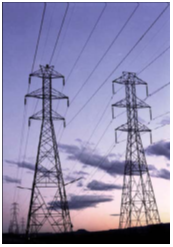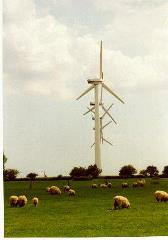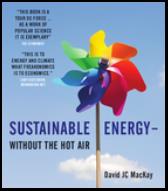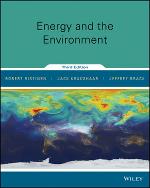Goucher CollegeEnergy, Physics and the EnvironmentPHY.250Spring 2019
· Instructor
Dr. Sasha Dukan
· Textbooks
Required: Ristinen and Kraushaar: Energy and the Environment, 3nd edition, Wiley. Required: David JC MacKay: Sustainable Energy-Without the Hot Air, available to download for free at http://www.withouthotair.com/.
Additional resources: We will extensively use the on-line databases available through the Goucher library or through the external links in Canvas..
· Course Description
Introductory course in environmental physics that emphasizes the physical principles behind the production, transport and conversion of energy. The laws of thermodynamics and classical mechanics are applied to natural ecosystems and energy resources such as fossil fuels, nuclear energy, hydropower, wind, solar power etc. These resources are analyzed in terms of the societal and environmental impacts of the associated technologies.
· Course Learning Outcomes
By the end of the course, the student will be able to:
· Evaluate environmental sustainability issues by systematically using discipline-specific knowledge. Each student will learn the physical principles behind the production, transport and conversion of energy · Determine how personal and collective decisions and actions affect the environment. Each student will be able to analyze societal and environmental issues related to energy production, transport and usage. Each student will be able to determine energy production/consumption impact on our environment both locally and globally. · Formulate potential solutions to environmental sustainability problems taking into account the connections that exist between society and natural systems. Each student will be able to state his/her own opinion about future energy production, participate in the ongoing global debate and make informed decisions based on available scientific knowledge.
· Instructional Methods
Students have an opportunity to learn in depth the basic concepts of environmental physics from a variety of sources during the semester, including: Ž Assigned textbook and literature readings Ž Classroom lectures and discussions Ž Directed search of internet sources Ž Presentation of the independent projects Ž Frequent computer demonstrations and simulations Ž Homework assignments and presentation of solutions Ž Discussions with me outside of the class Ž Two in-class hourly exams
Classroom time will be mostly centered around the discussions and student participation is required. I do not keep attendance but unexcused absence will be noticed.
· Responsibilities of Students
In order to get the most out of this course: Ž Attend each class, arrive on time and come prepared . Read an assigned sections of the textbook before coming to the class so that you can fully participate in a discussion. Ž Participate in class by paying close attention to what is presented and participate in the discussions. Ž Work on and try to complete all homework problems on time. You are encouraged to discuss problems with your peers but, if at all possible, complete these problems without assistance from anyone else. Make your work neat and carefully organized. If I cant follow your solution then you will not receive a full credit. Ž Come talk to me outside of the class frequently. Asking for help or hints with solving problems, or asking for clarification of the lectures or the textbook demonstrates your interest in the subject.
· Classroom Activities
Discussion based classroom instructions will not necessarily follow the sequence of topics presented in the textbook, there will be additional supplemental readings assigned. Second-half of the class (after the spring break) will be based mostly on the presentations of the independent projects. There will be an extensive use of multimedia presentations in order to enhance classroom experience and connect covered material to everyday life. A significant amount of time will be spent in developing problem solving strategies which are necessary in learning and understanding physics principles behind energy production, transport and use. Problems worked in the lectures will occasionally appear on the exams, so it is in your best interest to regularly attend the lectures. Canvas will serve as an on-line board where you can find updated information related to the course as well as your weekly homework assignments and quizzes.
· Independent Projects
One of the course goals is that each student in the class becomes an expert on a particular topic related to alternative/renewable energy use and its feasibility with current technology. In the first week of classes each student will be assigned a research project from the following list:
Project 1: Batteries and Electric/Hybrid Cars: Julia Project 2: Prospects for Nuclear Fusion Reactors-Logan Project 3: Solar Thermal Power Generation, Active and Passive Solar Heating and Power Generation: Marcus Project 4: Photovoltaic Cells, Direct Conversion of Solar to Electrical Energy-Charlotte Project 5: Energy from Wind-Jonathan (JJ) Project 6: Hydroelectricity-Eddah Project 7: Energy from Waves and Tides-Connor Project 8: Energy from Biomass: Fuels Kristine Project 9: Energy from Biomass: Municipal Waste-Josh Project 10: Geothermal Energy: Ephrata
Student will present a 20-min long presentation on an assigned project that will be followed by discussion in the class and write a 12-20 pages final paper due in the last week of classes. Students presentation and the paper will have to address in depth scientific, social and environmental issues related to the topic. Complete presentation/paper guidelines are posted in Canvas while the schedule of the presentations and due dates for the final paper are posted in the class schedule. The papers will be peer-reviewed according to the schedule and timeline posted in Canvas Students are required to schedule a minimum of two meetings with me about the projectthe first meeting before Mar 15 and the second meeting within a week after the presentation.
· Homework Assignments
Homework assignments will have a variety of forms: Ž Reading assignments Ž 5 to 10 questions/problems per chapter per week, Ž Projects involving internet and literature search Ž Hands-on week-long projects Ž Reading Quizzes in Canvas
These will be due at the beginning of the class according to the homework schedules. No late homework will be accepted. Homework assignments and homework solutions will be posted in Canvas. You are encouraged to work on a homework assignment with other students, but this does not mean distributing the work load or copying. The main purpose of a homework assignment is to give you practice in solving problems, further your understanding of issues discussed and prepare you for the exams. Search for the solutions on the internet and/or use of the solution sets that might be available on the internet is strictly prohibited. All students are bound by the standards of the Academic Honor Code and suspected violators will be sent to the Honors Board.
· Exams
There will be two in-class hour-long exams. Tentative dates which may be adjusted according to the rate at which the material is being covered are listed in the class schedule.
· Grades
The course grade will be based upon exams, homework assignments, quality of peer review, and class participation. There will be no make-up exams. The grade breakdown is as follows: Two hourly exams: 40%
· A ≥90.1% ; 87.1% ≤ A- <90%; · 83.1% ≤ B+ <87%; 73.1% ≤ B<83%; 70.1% ≤ B- <73%; · 67.1% ≤ C+ <70%; 63.1% ≤ C < 67%; 60.1% ≤ C- < 63%; · 57.1% ≤ D+ < 60%; 53.1% ≤ D < 57%; 50.1% ≤ D- < 53%; · numerical grade below 50% is F
· Academic Ethics
All students are bound by the standards of the Academic Honor Code, found at www.goucher.edu/documents/General/AcademicHonorCode.pdf · Religious Observance Policy
If you need to request accommodation for religious observance, fill out the form available here: and submit it to me as soon as possible and at least two weeks before the observance. If you communicate with me in a timely manner and complete any mutually agreed upon make-up work, any such absences or schedule changes will be excused and will not adversely affect your grade.
· Accommodating Students with Disabilities Goucher College makes reasonable academic accommodations for students with documented disabilities. Students requesting accommodations must make their request and provide appropriate documentation to the Office of Accessibility Services (OAS). Because classes change every semester, eligible students must obtain a new accommodation letter from the Disabilities Specialist every semester and review this letter with their professors so the accommodations can be implemented. The Director of OAS is available by appointment to answer questions and discuss any implementation issues you may have. Address general inquiries to 410-337-6146 or e-mail access@goucher.edu. |



